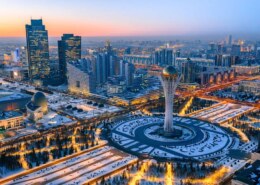Kazakhstan is a country located in Central Asia and Eastern Europe, with a rich history and culture. Here is everything you need to know about Kazakhstan:
Geography and Climate: Kazakhstan is the largest landlocked country in the world, covering an area of 2.7 million square kilometers. The country has a diverse geography that includes mountains, steppes, deserts, and lakes. The climate is continental, with cold winters and hot summers.
Population and Language: Kazakhstan has a population of around 18 million people, and its official language is Kazakh, which is part of the Turkic language family. Russian is also widely spoken, especially in urban areas.
Economy: Kazakhstan is rich in natural resources, including oil, gas, and minerals, and is one of the most developed economies in Central Asia. The country has been investing in infrastructure and promoting economic diversification to reduce its dependence on oil exports.
Culture and Tourism: Kazakhstan has a rich culture that reflects its history and diverse ethnic groups. The traditional nomadic lifestyle of the Kazakh people is still evident in many parts of the country. Popular tourist attractions include the city of Almaty, the Charyn Canyon, and the Altyn Emel National Park.
Politics and Government: Kazakhstan is a presidential republic, and its current president is Kassym-Jomart Tokayev. The country has been working to promote political and economic reforms, but concerns remain about restrictions on political freedoms and human rights.
Sports: Sports are an important part of Kazakh culture, with popular sports including football, ice hockey, and boxing. Kazakhstan has participated in every Summer Olympics since 1996 and has won a total of 59 medals, including 16 gold.
Cuisine: Kazakh cuisine is diverse and reflects the country’s nomadic traditions. Popular dishes include beshbarmak (boiled meat with noodles), kazy (horse sausage), and shashlik (grilled meat on skewers). The country is also known for its dairy products, including kumis (fermented mare’s milk) and shubat (fermented camel’s milk).
Transportation: Kazakhstan has a well-developed transportation infrastructure, including railways, highways, and airports. The country is also a key transit hub for trade and transportation between Europe and Asia, with the Belt and Road Initiative boosting its connectivity with China.
Religion: The majority of the population in Kazakhstan is Muslim, with Sunni Islam being the dominant branch. There are also significant Christian and Jewish communities in the country.
Education: Kazakhstan has made significant investments in education, with a literacy rate of over 99%. The country has a well-established system of higher education, with several universities offering programs in English and Russian.

